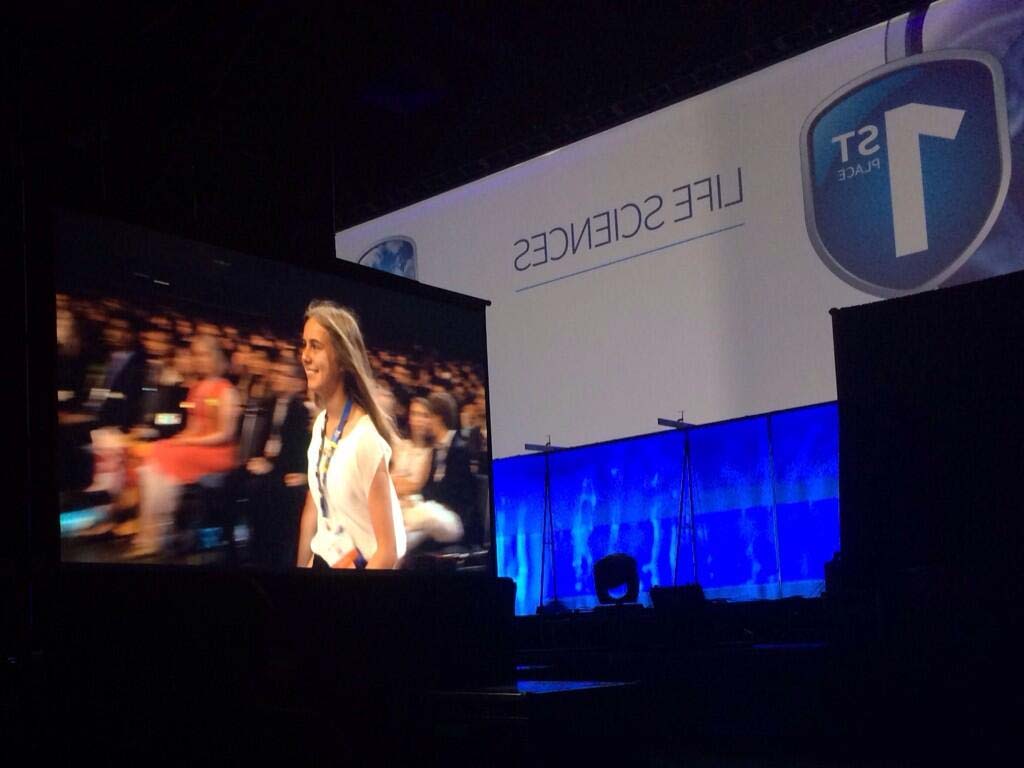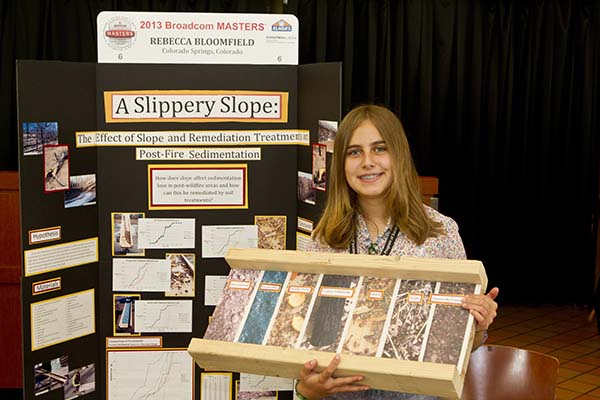Alumni, Broadcom MASTERS, ISEF
Rebecca Bloomfield takes risk on science fair

Rebecca Bloomfield of Colorado Springs, Colorado won second place in Technology at Broadcom MASTERS 2013 and a first award in Microbiology at Intel International Science and Engineering Fair 2014. Read below to learn more about Rebecca’s projects and her love of science.
Choosing to do a science fair project is a risk. You pour hundreds of hours into a project that may or may not culminate in recognition. You pour your heart and soul into it; you work, you sacrifice. While my friends are holding jobs, attending social events, and relaxing the summer away, I’m in the lab every day. And I love it.
Involvement in science fair was a natural trajectory for me. I grew up in the Colorado mountains. My innate curiosity motivated me to explore the woods, to catch ladybugs, to create imaginary worlds. As I got older I was driven by the same curiosity, but also by the desire to improve the world around me. My eighth grade year, I was evacuated during a wildfire. When the smoke cleared, 347 homes were burned to the ground and hundreds of people were threatened by subsequent flooding. I did what I could: I tested flooding and erosion mitigation strategies.

I ended up winning regional, then state science fairs, and so I decided to enter Broadcom MASTERS because it was the only continuation opportunity afforded to middle school students. I was excited to be a finalist, and even more thrilled to go to Washington, D.C.
When I arrived at Broadcom MASTERS, I found friends and comrades. I learned to lead and how to share leadership through the many activities we did as a team. It was a whirlwind week: going from science challenges to the Kennedy Center, judging to a nighttime monument tour. I can confidently say that the highlight of the trip for everyone was meeting President Obama.
Since sixth grade, my goal was to reach Intel ISEF. To my sixth grade self, Intel ISEF was the unattainable goal, the remote hope to work towards. Before Intel ISEF, my parents asked me if I was excited to go in the following weeks. I replied that yes, of course I was, but deep down I couldn’t convince myself of the reality. It hit me when we walked to the convention center and signs were plastered everywhere, and the hubbub of languages rose over the amassed crowds. Inside the exhibit hall, there were an overwhelming number of projects, hundreds in every category. The universal reaction was to stop and stare. Everyone in this shrine of science was just as thrilled, and apprehensive, and smart as I was.
When I talked with my first judge, my heart rate was far faster than is healthy, and I was in a nervous sweat the whole time. I started off strong explaining the background of my experiment, rocketed my way through the procedure and statistics, far too briefly outlined results, and stumbled through applications. Some of the questions the judges asked were easy, some confusing, some perplexing. I was fully aware of the situation; even just talking through my project made me intensely aware of the flaws and odd wordings and hopefully not wrong reasoning in my project. But that, I remember thinking, means that I know my project far more intimately than any of the judges or anybody else ever will, and it was up to me to put myself out there.
After eons of nervous anticipation at the Intel ISEF Grand Awards ceremony, they began the announcement “The first place winner in the category of microbiology”, then “…from Colorado Springs…” I stood up and I think ran to the stage. I was aware of disjointed images – my delegation moving their feet out of the way and smiling at me, the corridor of hundreds of people, the start of the stage ramp, my face on the screen. I had no coherent image of my walk up to the stage. I could have been floating or flying and it wouldn’t have felt any different. I couldn’t stop grinning, not that I tried very hard.
Both Intel ISEF and Broadcom MASTERS were amazing experiences. Every conversation was interesting and intellectually stimulating. You could talk to anyone and ask them anything, regardless of nationality, grade, social class, gender, or any of the other normal barriers to conversation. Everyone’s a science geek. It has made me more confident in my abilities and myself as a young scientist.
So, my advice to other young scientists:
First, figure out a need or an interest. A science fair project is only going to be impactful to you and the judges if you care deeply about it. We are witnesses to the world around us and as scientists we can be more than passive observers. Find something that compels you to discover, to create.
That said, completing a science fair project takes a massive amount of work and a healthy serving of disappointment and frustration. The key is to stick with it. It took a full month of changing the procedure before the project I took to Intel ISEF got off the ground. Albert Einstein once said that genius is 1% inspiration and 99% perspiration.
It’s also well worth the time investment to know your stuff. Read the previous studies relevant to your research. Learn alternate methods to what you’re testing. It will make your results more meaningful.
Most importantly, I completely disagree with the dictionary definition of young as “immature or inexperienced; childish.” We are young, but we have the power to change the world. People our age are curing forms of cancer, inventing prosthetic limbs, developing new fuel sources, addressing community issues, and doing research on par with adult scientists. We can be at the forefront of our fields, and we can improve our communities. We are old enough to see the world as it is, young enough to imagine the world as it could be, and audacious enough to change it.


